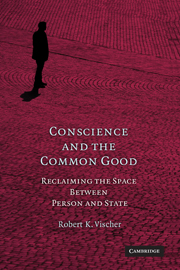2 - Conscience and the Person
Published online by Cambridge University Press: 05 June 2012
Summary
When Daniel Seeger invoked his conscience as the reason why he should be excused from military service, he made a claim about himself. In fact, his expressed judgment that fighting in the war was incompatible with his moral beliefs may tell us more about Seeger than it does about the war. After all, thousands of other conscripts encountered no moral dilemmas as they joined the same war, and many of them would vehemently disagree with Seeger's conclusions about the war's moral status.
The claim of conscience as self-revelation is familiar territory in our society, where the recognition of overarching moral absolutes has long since given way to the acknowledgment of deeply personal conceptions of moral truth. But while the personal dimension of conscience may be common knowledge, the content of that dimension is not. The “black box” image is apt because, while we remain convinced that conscience is important to personal identity, we know next to nothing about its nature or its function, nor do we believe that such knowledge is realistically attainable.
In the previous chapter, we highlighted how the law's individualist and agnostic stance toward conscience short-circuits a fuller exploration of the relational paths by which conscience contributes to human flourishing. By bringing those paths into sharper relief, we can better understand how the law supports or impedes that flourishing. In this chapter, we will focus on how and why conscience matters to its bearer's sense of identity.
- Type
- Chapter
- Information
- Conscience and the Common GoodReclaiming the Space Between Person and State, pp. 48 - 72Publisher: Cambridge University PressPrint publication year: 2009



